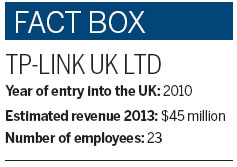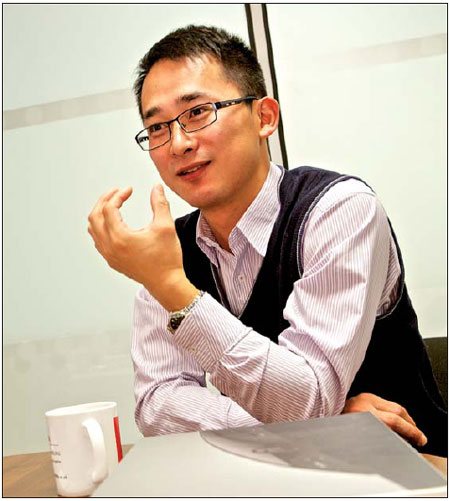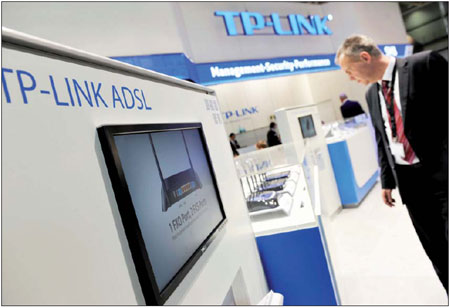The router to global connectivity

Young talent helps Chinese networking gear maker carve a niche in UK
Young talent has played a key role in shaping the fortunes and success of some Chinese companies in key overseas markets like the United Kingdom. The Shenzhen-based networking gear maker TP-Link, a market leader in China and the fourth ranked company in the Grant Thornton Tou Ying 25 tracker 2013, is one such firm that has carved a niche for itself in the highly competitive and fragmented UK networking gear market.
Eric Wang, the 27-year-old country manager of TP-Link UK Ltd, says that despite the high ranking in the tracker, which tracks the fastest growing UK businesses with Chinese parent companies in terms of turnover, the company wants to reach out to more areas and customers in the UK as part of the diversified growth approach it follows in global markets.
TP-Link's UK sales have risen from just $4.5 million (3.48 million euros) in 2010 to an estimated $45 million this year. The UK is now TP-Link's fourth largest global market in terms of revenue, after Brazil, Russia and Germany. The company, which started its China operations in 1996, is a market leader in its home market for networking products like routers and Internet-protocol cameras and currently employs 23 people at its UK operations.
Globally, TP-Link leads the wireless local area network market, with a 42.29 percent share for the first quarter of 2013, according to the IT market research and advisory firm IDC. During the period, it has had more shipment volume for the WLAN market than the next two brands combined.
TP-Link's process of internationalization started in 2005, when it began selling in overseas markets through distributors.
Looking to increase its international sales, TP-Link established its first overseas subsidiary in Sweden, but after a period of trial and error the company decided to leave the country in 2009.
"We realized that Sweden could not fully represent the characteristics of the whole European market. In contrast, the IT markets of Germany, the UK and Italy have often led the development of Europe's IT markets, whether in sales strategy, brand promotion or logistics management," Wang says.
Hoping to focus its resources on these key markets, TP-Link set up a subsidiary in Germany in 2009. From a team of three people, including Wang, the subsidiary's staff grew to about 20 people in 2010, at which time he was sent to Britain.
"Because we did so well in Germany, we wanted to replicate our success in other markets, so we then expanded into Italy and the UK," Wang says.
Wang says that the biggest challenge for his company in the early days in the UK was the scattered location of the UK's consumer electronics shops. "In China's domestic market, or even in some Asian markets, we had no difficulty finding the IT shops that make up our customer base as they are usually clustered together, often in dedicated sites. By comparison, Britain's IT shops are scattered across the country.
"They are everywhere. We didn't have a database to track them down and even if we did, we wouldn't have the time to visit them all. Even if we had the resources to turn up at their shops, they won't talk to us about business," he says.
Through perseverance and close linkages with distributors, TP-Link not only managed to break into the UK market for networking products but also gained favor with big retailers, Wang says.
"The difficulty with access to consumer electronics retailers is that they don't normally accept an unknown brand. Negotiations don't work, as they are looking at your financial figures and only want to partner with successful brands. But it's hard to be successful without their partnership," he says.
Being a new player in a big market, Wang says his company decided to team up with generic, rather than focused retailers.
"To overcome this vicious cycle, we decided that TP-Link as a new player in the UK market needed to look elsewhere for retail partnerships. We chose more generic retail stores like Tesco and Sainsbury, which are both grocery stores with consumer electronics product ranges," he says.
Wang says such an approach was helpful as, "these retailers are not focused on other consumer electronics brands". That strategy has more than paid off, and helped TP-Link establish a more complete presence in specialist retailers like Argos, PC World and Currys.
At the same time, Wang admits that it is important to be in constant touch with the local consumers, as it would help them stay ahead of the competition. US-based Netgear is one of its major competitors in the UK, he says. "It is hard to persuade consumers to make a switch. Education, marketing and better prices will help customers to try and chose our products," he says.

Strong support from the company's headquarters in Shenzhen, the enhanced focus on research and development, product design and cost control have all helped TP-Link forge ahead in the UK.
"On a day to day basis, the Shenzhen management allows me to make decisions for the UK market to respond to issues quickly. At the same time, my team helps in collecting British customer feedback and sends the information back to the headquarters for product improvement."
Wang says he maintains a simple and transparent corporate culture at TP-Link's UK office. He rewards his employees for performance and does his best to make them feel trusted and valued.
Fairness and rewards are qualities that are ingrained in TP-Link's corporate culture, Wang says, adding that the TP-Link's philosophy is as "you contribute, you'll get rewards".
Citing his own example, he says that he joined the company right after university and was given an opportunity to be part of the team spearheading the international expansion.
Wang says that since then he has been following the policy of, "I put my efforts in, and I learn and I grow".
Aside of work, Wang says he spends time in establishing contacts with local colleagues and in better understanding their thoughts. He says the next step of growth for TP-Link in the UK should be to gain more customers in the "brand conscious" small and medium-sized business sector.
"When I came to the UK, I didn't think that our revenue would be as big as it is now. If I could imagine such a big picture, I'd have been brave enough to invest more, so that my team can grow more quickly," he says.
He says potential areas for such investment could include hiring better quality accountants and lawyers, to improve efficiency. "The UK is a huge market for consumer electronics. It's worth investing and you'll get the returns," he says.
Business aside, Wang says it is important to have a good work-life balance to succeed. "Before I came to the UK, I spent a year in Germany. I used to follow a work-oriented lifestyle in those days and I didn't like it much. But the work-life balance is good now in the UK," he says.
In recent years Wang has witnessed more and more Chinese companies expanding into the British market and says he believes every company needs to find its own growth model. "Before you come out, you need to be 100 percent confident that your headquarters supports you fully. That gives you confidence," he says.
cecily.liu@chinadaily.com.cn
| Eric Wang (below), country manager of networking gear maker TP-Link UK Ltd, says that strong support from company headquarters, focus on R&D, product design and cost control are key to the company's growth in the UK market. Ma Ning / Xinhua, Xie Songxin / China Daily |

(China Daily European Weekly 12/06/2013 page8)
Today's Top News
- Chinese landmark trade corridor handles over 5m TEUs
- China holds first national civil service exam since raising eligibility age cap
- Xi's article on CPC self-reform to be published
- Xi stresses improving long-term mechanisms for cyberspace governance
- Experts share ideas on advancing human rights
- Japan PM's remarks on Taiwan send severely wrong signal































